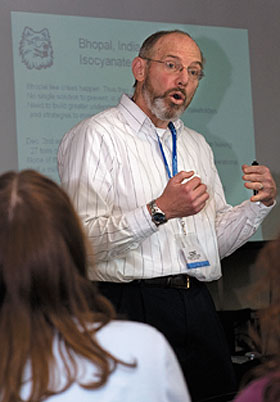  |
| HOME | THIS ISSUE | CALENDAR | GRANTS | BACK ISSUES | < BACK | NEXT > |
New course helps science grad students prepare for job search by Cindy Weiss - March 24, 2008 | ||||
| Muge Acik is starting to hunt for a job, and she’s nervous. Dressed in a neat black pantsuit, the polymer science graduate student sits across from her interviewer and begins to answer his questions. Thirty minutes later, her interviewer turns to a group of fellow students who’ve been watching. “What do people who saw the interview think about what we did?” he asks. “What about body language?” asks one student. “I watched her wrists – she was nervous,” comments another. “You can’t make eye contact all the time – where else should you look?” asks a third. The mock interview, which Acik requested, is part of a new course, Chemistry 300, to help graduate students prepare to find a job in industry or academia. The course, possibly the first semester-length course at UConn to teach graduate students in the sciences how to write a resume, dress for success, and succeed in their first year on the job, is taught by Daniel Eustace, a retired Ph.D. chemist and manager who has worked at Exxon-Mobil and Polaroid. He also has nine years of experience running short courses and workshops for the American Chemical Society (ACS) on job skills for chemists. About a dozen graduate students in chemistry, chemical engineering, and polymer science are taking the class, including Acik. “I want to help you get to the professional level – this is what motivates me,” he told the students during the first class. He also encourages the students to invite their friends to drop in on classes, and has podcast parts of it to expose a wider audience of graduate students to career planning (Listen at: www.clas.uconn.edu/podcasts/uploads/chem_300.mp3). Eustace’s aim is to get students who have spent years studying highly technical subjects to think about their options after graduate school and plan ahead. “What are your values? What is important to you?” he asks them, adding that their planning should include a back-up strategy. Chigozie Muoto, a master’s degree student in materials science and engineering, is taking the class to prepare for a career in industry. He will graduate in December, and wants to learn to market his skills. “I wanted to know how to go about searching for the job that would match my personality,” he says. “I know that the job market is more competitive now than ever before – I want to give myself a competitive edge.” Jan-Michael Carillo, a Ph.D. student in polymer science, is taking the course to learn about finding a job in industry, doing computer simulations on polymer systems.
Almost all the students taking the course are foreign-born, and their concerns about interviewing are often cultural, such as, when is it appropriate to shake hands: at the beginning of the interview, the end, or both? Foreign students who come to UConn on a student visa can apply to the Immigration and Naturalization Service to remain in the U.S. for an industrial or postdoctoral position after receiving their degree. Eventually, they may obtain a green card that allows them to be permanently employed here. In this culture, Eustace warns them, approaching too close to an interviewer would be considered uncomfortable. “This is exactly how you want to appear – professional, and not distracting,” he says, pointing to Acik’s interview attire – “no dangly earrings, no scent.” He says the goal is for the students to know 80 percent of the questions they are likely to face in an interview, and to be prepared: “You should know these questions are going to come.” But the course is not limited to interviewing skills. The students are learning about career choices, patents and intellectual property issues, ethical behavior, problem-solving, how to conduct a job search, and how to behave during their first year on the job and get promoted. Communications techniques that Eustace teaches include e-mailing, telephone skills, writing for publications, listening, and making small talk with colleagues. “Forty to 60 percent of your job as a manager is listening,” he says. Part of Eustace’s plan is to connect students with professionals on the job. In one class, he set up a conference call with a colleague in St. Louis. Eustace also urges the students to participate actively and to network with each other. The class has a weblog where they can post writing assignments, share ideas, and find job search leads. |
| ADVANCE HOME UCONN HOME |

